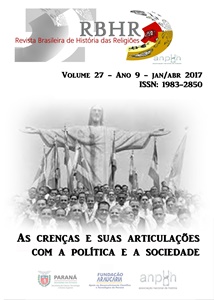Religious and political leadership in Brazil at the turn of the 19th and 20th centuries – the case of Father Cícero
Resumo
Brazil is a very interesting place for academic research regarding religious and political leadership. It does not happen only due to the continuous supply of religious leaders, but also owing to their social and political influence. One of good examples of such leaders at the turn of the XIX and XX centuries is certainly Father Cicero, who, in spite of the problems connected with the disapproval of his activity on the part of the Vatican, is still regarded as a perfect example of both an outstanding politician and a non-canonized popular saint with the place of his earthly religious and political activity turned long ago into destination of pilgrimages and important popular religiosity shrines. Using the biographical method and coming out of the Weberian concepts of charismatic leadership, the author tries to explain the reasons behind his tremendous popularity and a conflict with the Catholic hierarchy, as well as to comment on the background of his cult in the context of social, economic and political changes taking place in Brazil during his lifetime.Downloads
DECLARAÇÃO DE ORIGINALIDADE E DIREITOS AUTORAIS
Declaro que o presente artigo é original, não tendo sido submetido à publicação em qualquer outro periódico nacional ou internacional, quer seja em parte ou em sua totalidade.
Os direitos autorais pertencem exclusivamente aos autores. Os direitos de licenciamento utilizados pelo periódico é a licença Creative Commons Attribution 3.0 (CC BY 3.0): são permitidos o acompartilhamento (cópia e distribuição do material em qualqer meio ou formato) e adaptação (remix, transformação e criação de material a partir do conteúdo assim licenciado para quaisquer fins, inclusive comerciais.
Recomenda-se a leitura desse link para maiores informações sobre o tema: fornecimento de créditos e referências de forma correta, entre outros detalhes cruciais para uso adequado do material licenciado.







